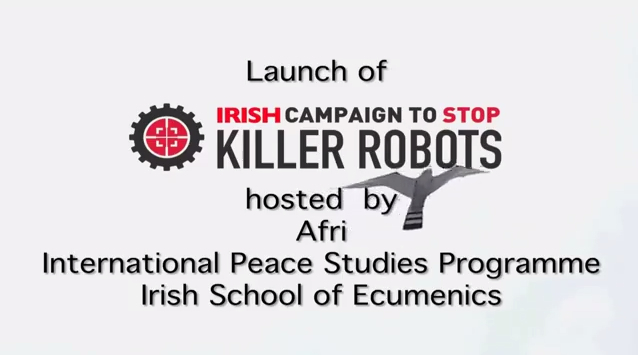
Launch of the Irish campaign

On 10 April, the Irish launch of the Campaign to Stop Killer Robots took place at at Trinity College Dublin with a keynote address by Professor Noel Sharkey, chair of the International Committee for Robot Arms Control, a founder of the global Campaign to Stop Killer Robots. Afri—a peace and human rights organisation that opposes war and militarization—held the launch in association with the International Peace Studies Programme of the Irish School of Ecumenics. Other organisations participating in the Irish Campaign to Stop Killer Robots include Amnesty International Ireland and Pax Christi Ireland.
Born in Belfast, Sharkey is a well-known robotics and artificial intelligence expert at the University of Sheffield in the UK. At the event, he called on the Irish government to show leadership on the crucial issue of ensuring human control over targeting and attack decisions by banning fully autonomous weapons.
In a press release, Afri described the launch as timely given the context of moves by some countries towards the use of lethal autonomous robotic weapons. It expressed strong support for call for a comprehensive ban and said it was “delighted” to have Professor Sharkey at the launch of campaign in Ireland.
Afri co-ordinator Joe Murray called for an urgent ban of autonomous weapons, noting, “Should we allow the monumentally insane policy of developing fully autonomous weapons to be pursued then even the element of human intervention will be sidelined and we will have war and violence of epic proportions. It is time to wake up and shout, stop.”
Tony D’Costa of Pax Christi Ireland warned that the weapons cross an unacceptable threshold that is most dangerous to our shared morality: “Autonomous weapons have nothing good to offer us as they threaten global peace and international security” and “undermine the whole landscape of those basic universal human values which protect innocent civilians from harm in times of war or other conflict.”
Amnesty International Ireland’s executive director Colm O’Gorman cautioned that the use of fully autonomous weapons “would result in unlawful killings and injuries both in situations of armed conflict, where both international humanitarian law and international human rights law apply, and in law enforcement operations, where international human rights law applies.”
As part of the launch events, Professor Sharkey and Irish NGO representatives met with officials from the Department of Foreign Affairs and Trade and the Irish Defence Forces to discuss the new campaign and its objectives.
Ireland made its first public statement on the matter at the UN General Assembly in September 2013, stating that “our focus must always be to ensure respect for international humanitarian law and human rights,” principles that “must also apply to weapons which will be developed in the future, such as fully autonomous weapons systems.” Ireland supported the November 2013 agreement on a mandate at the Convention on Conventional Weapons (CCW) to discuss fully autonomous weapons, emphasizing the need for “examination of this issue before such systems are deployed.”
In the meeting with NGOs, Irish disarmament officials confirmed that Ireland will participate in the first multilateral meeting to discuss concerns over these dangerous new weapons at the United Nations in Geneva next month. More than 100 nations are expected to attend the Convention on Conventional Weapons (CCW) experts meeting on ‘lethal autonomous weapons systems.’ Ireland’s delegation will be led by its new disarmament representative Ambassador Patricia O’Brien, who previously served as United Nations Legal Counsel from 2008 to 2013.
Ireland played a leadership in the Ottawa and Oslo processes, diplomatic initiatives that resulted in the swift adoption of the treaties banning landmines and cluster munitions. As a proponent of humanitarian disarmament, Ireland is known for working in partnerships with like-minded governments as well as with international organizations and civil society. It has emphasized the need for the CCW experts meeting to include “broad participation from variety of expertise.”
During his visit Sharkey also gave the inaugural lecture of the Philosophy Society at University College Dublin on 9 April.
For more information on the Irish Campaign Stop Killer Robots, see:
- Short film by Afri (3.00min)
- Press release (10 April)


